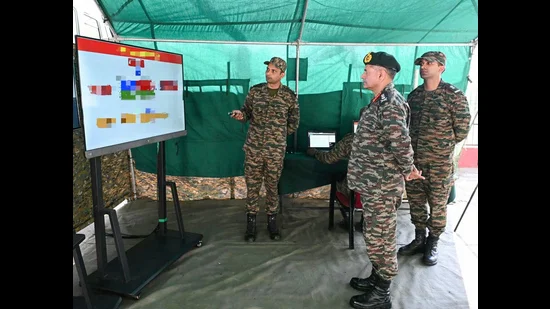Srinagar, June 22: Chief of Army Staff General Upendra Dwivedi on Sunday reviewed the security situation in the Kashmir Valley and assessed operational preparedness ahead of the Amarnath Yatra, which begins on July 3. The annual pilgrimage, one of the most significant Hindu religious events, sees lakhs of devotees trek to the 3,880-metre-high cave shrine nestled in the Himalayas of south Kashmir.
In a post on X, the Additional Directorate General of Public Information (ADGPI) stated that General Dwivedi was given a comprehensive briefing on the current operational landscape in the region. “He was briefed on the current operational dynamics and the broader strategic landscape, including a demonstration on integration of advanced technologies in operations, leading to smarter decisions, enhanced surveillance and response mechanisms,” ADGPI wrote.
During his visit, the Army Chief also commended Chinar Corps personnel for their “unwavering commitment to ensuring peace and stability through decisive counter-terror operations and developmental outreach efforts.”
The annual pilgrimage, which runs from July 3 to August 10, has prompted the government to implement heightened security protocols, including declaring both yatra routes — from Pahalgam and Baltal — as no-fly zones. The restrictions, effective from July 1, prohibit the use of drones, hot air balloons, and other flying objects, citing safety and security concerns.
In response to the airspace restrictions, the Amarnath Shrine Board on June 18 announced that helicopter services will not be available for pilgrims this year. All devotees must undertake the journey on foot, or avail themselves of ponies and palkis.
The yatra involves traversing narrow mountain paths, crossing ice-fed streams, and braving unpredictable weather conditions. With lakhs expected to participate, security agencies are focused on maintaining vigilance along the route, ensuring both safety and seamless conduct of the pilgrimage.
This year’s preparations come amid continued efforts by security forces to maintain stability in the region through proactive counter-terror operations and civil outreach.

